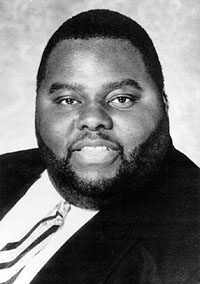
Dr. James "Butch" Rosser
|
prevent death of young athletes
Yale surgeon Dr. James "Butch" Rosser has devised a portable, cost-effective testing program to detect potential causes of sudden death in young, competitive athletes.
Called "Operation Beating Heart," the program uses a combination of telemedicine -- remote care of patients using modern communications -- and certified athletic trainers to screen for causes of sudden death in athletes.
A common cause of death on the athletic field is a rare, hard-to-detect heart condition called hypertrophic cardiomyopathy. Another cause is asthma, which often does not show up except under stressed conditions and has a high death rate if not quickly and properly treated. According to Rosser, most of these conditions are unknown to the athletes, parents and family physicians.
By equipping certified athletic trainers with space-age evaluation tools and providing quality oversight and direction from experts at a remote location using telemedicine, Operation Beating Heart seeks to make it cost-effective to screen large numbers of athletes for hidden health conditions before they join sports programs, explains Rosser.
The Operation Beating Heart exam includes a miniature, five-pound ultrasound device used to scan the heart for defects, a computerized pulmonary function exam and an electrocardiogram (EKG). According to Rosser, current pre-participation screenings do not routinely perform these tests, which have historically been performed in a clinic or hospital. Other attempts have been made to achieve a goal standard medical evaluation, he says, but have not used this unique approach to accomplish better protection for the millions of athletes that participate in competitive sports.
"Even though medical experts agree that the current exams do not pick up on the presence of 'silent killer' conditions, they have been stymied to come up with a program that cost-effectively addresses this lethal issue," says Rosser. "Operation Beating Heart brings the cutting edge of health care to athletes today. We use telemedicine to bring the specialists directly to athletes."
"These technologies could revolutionize the way health care providers detect abnormalities in an athlete," Rosser adds. "Traditionally, more advanced testing is only done if an athlete develops a problem. Unfortunately, as we have seen recently, this may be too late to save a life. The medical establishment must change from a defensive to an offensive health care strategy that picks up problems before they become lethal."
The Operation Beating Heart program was successfully launched at Savannah State University in August 2001. Members of the university's football team were screened using the cutting-edge techniques. Rosser says additional Operation Beating Heart programs are planned for other schools.
-- By Karen Peart
T H I S
Bulletin Home
 W E E K ' S
W E E K ' S S T O R I E S
S T O R I E S![]()
 Yale boasts five new Rhodes, Marshall Scholars
Yale boasts five new Rhodes, Marshall Scholars
![]()
![]()
 Internationally renowned journalist examines causes of terrorists' rage
Internationally renowned journalist examines causes of terrorists' rage![]()
![]()
 Former U.S. ambassador discusses role of leaders in Israel-Palestine clash
Former U.S. ambassador discusses role of leaders in Israel-Palestine clash![]()
![]()
 Sternberg to focus on students' rights as head of APA
Sternberg to focus on students' rights as head of APA![]()
![]()
 DeVane Lectures to look at love, law in Cervantes' works
DeVane Lectures to look at love, law in Cervantes' works![]()
![]()
 Famed architect Maya Lin discusses how her works are inspired . . .
Famed architect Maya Lin discusses how her works are inspired . . .![]()
![]()
 In Focus: International Spouses & Partners at Yale
In Focus: International Spouses & Partners at Yale
![]()
![]()
 Scholar urges expansion of efforts to save giant pandas
Scholar urges expansion of efforts to save giant pandas
![]()
![]()
 MEDICAL SCHOOL NEWS
MEDICAL SCHOOL NEWS Screening program seeks to prevent death of young athletes
Screening program seeks to prevent death of young athletes
![]()
 Research shows doctors refer fewer women for post-heart-attack . . .
Research shows doctors refer fewer women for post-heart-attack . . .
![]()
 Long-term study proves value of antiepileptic drug
Long-term study proves value of antiepileptic drug
![]()
 Scientists discover how deadly bacteria infect cells
Scientists discover how deadly bacteria infect cells
![]()
 Roundup of recent health-related discoveries
Roundup of recent health-related discoveries
![]()
 New Yale-Griffin Center Initiatives
New Yale-Griffin Center Initiatives
![]()
![]()
 Piano performance piece to open Yale Rep series
Piano performance piece to open Yale Rep series
![]()
![]()
 Yale Rep announces spring line-up of plays
Yale Rep announces spring line-up of plays
![]()
![]()
 Happy Holidays! Season's Greetings from the Staff . . .
Happy Holidays! Season's Greetings from the Staff . . .
![]()
![]()
 Ethics of health care will be explored in ISPS talk
Ethics of health care will be explored in ISPS talk
![]()
![]()
 Yale athletes to offer free basketball clinic to neighborhood youths
Yale athletes to offer free basketball clinic to neighborhood youths
![]()
![]()
 A window to treasure
A window to treasure
![]()
![]()
 'Blood and Race' in the U.S. is topic of talk
'Blood and Race' in the U.S. is topic of talk
![]()
![]()
 Yale Books in Brief
Yale Books in Brief
![]()
![]()
 Campus Notes
Campus Notes
![]()
 |
| Visiting on Campus
Visiting on Campus |
| Calendar of Events
Calendar of Events |
| In the News
In the News |
| Bulletin Board
Bulletin Board![]()
Yale Scoreboard |
| Classified Ads
Classified Ads |
| Search Archives
Search Archives |
| Deadlines
Deadlines![]()
Bulletin Staff |
| Public Affairs Home
Public Affairs Home |
| News Releases
News Releases |
| E-Mail Us
E-Mail Us |
| Yale Home Page
Yale Home Page